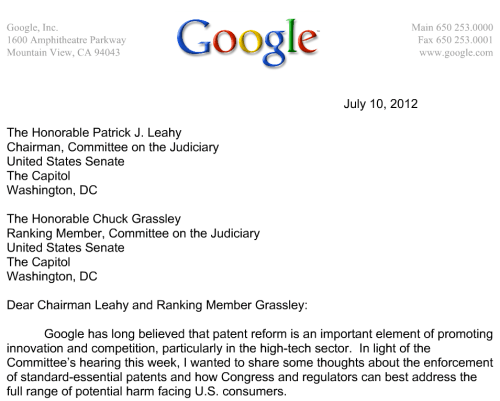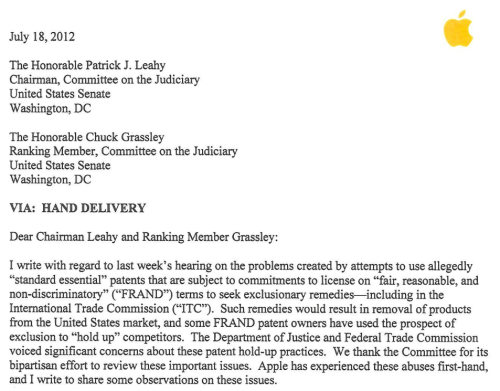Google, in a letter to the Senate Judiciary Committee, argues that inventions that become ubiquitous due to popularity should be considered de facto standards, reports AllThingsD.
Google General Counsel Kent Walker wrote:
While collaborative [Standards Setting Organizations (SSOs)] play an important part in the overall standard setting system, and are particularly prominent in industries such as telecommunications, they are not the only source of standards. Indeed, many of the same interoperability benefits that the FTC and others have touted in the SSO context also occur when one firm publishes information about an otherwise proprietary standard and other firms then independently decide (whether by choice or of necessity) to make complementary investments to support that standard in their products. … Because proprietary or de facto standards can have just as important effects on consumer welfare, the Committee's concern regarding the abuse of SEPs should encompass them as well.
Google is arguing that just as there are some patents that are standards essential, there are also patents that are commercially essential. Meaning that withholding those patents would be harmful to the competitive marketplace. Multi-touch or Slide-to-Unlock would be some of the inventions covered under this idea.
As one would expect, Apple disagrees.
Apple General Counsel Bruce Sewell criticized Walker's argument saying, "That a proprietary technology becomes quite popular does not transform it into a 'standard' subject to the same legal constraints as true standards." He believes that standards provide the platform for products to compete against each other and non-standardized technologies differentiate between those products.
The capabilities of an iPhone are categorically different from a conventional phone, and result from Apple's ability to bring its traditional innovation in computing to the mobile market. Using an iPhone to take photos, manage a home-finance spreadsheet, play video games, or run countless other applications has nothing to do with standardized protocols. Apple spent billions in research and development to create the iPhone, and third party software developers have spent billions more to develop applications that run on it. The price of an iPhone reflects the value of these nonstandardized technologies - as well as the value of the aesthetic design of the iPhone, which also reflects immense study and development by Apple, and which is entirely unrelated to standards.
AllThingsD has posted the both letters along with a detailed analysis at the link below...
Read More




Google General Counsel Kent Walker wrote:
While collaborative [Standards Setting Organizations (SSOs)] play an important part in the overall standard setting system, and are particularly prominent in industries such as telecommunications, they are not the only source of standards. Indeed, many of the same interoperability benefits that the FTC and others have touted in the SSO context also occur when one firm publishes information about an otherwise proprietary standard and other firms then independently decide (whether by choice or of necessity) to make complementary investments to support that standard in their products. … Because proprietary or de facto standards can have just as important effects on consumer welfare, the Committee's concern regarding the abuse of SEPs should encompass them as well.
Google is arguing that just as there are some patents that are standards essential, there are also patents that are commercially essential. Meaning that withholding those patents would be harmful to the competitive marketplace. Multi-touch or Slide-to-Unlock would be some of the inventions covered under this idea.
As one would expect, Apple disagrees.
Apple General Counsel Bruce Sewell criticized Walker's argument saying, "That a proprietary technology becomes quite popular does not transform it into a 'standard' subject to the same legal constraints as true standards." He believes that standards provide the platform for products to compete against each other and non-standardized technologies differentiate between those products.
The capabilities of an iPhone are categorically different from a conventional phone, and result from Apple's ability to bring its traditional innovation in computing to the mobile market. Using an iPhone to take photos, manage a home-finance spreadsheet, play video games, or run countless other applications has nothing to do with standardized protocols. Apple spent billions in research and development to create the iPhone, and third party software developers have spent billions more to develop applications that run on it. The price of an iPhone reflects the value of these nonstandardized technologies - as well as the value of the aesthetic design of the iPhone, which also reflects immense study and development by Apple, and which is entirely unrelated to standards.
AllThingsD has posted the both letters along with a detailed analysis at the link below...
Read More





